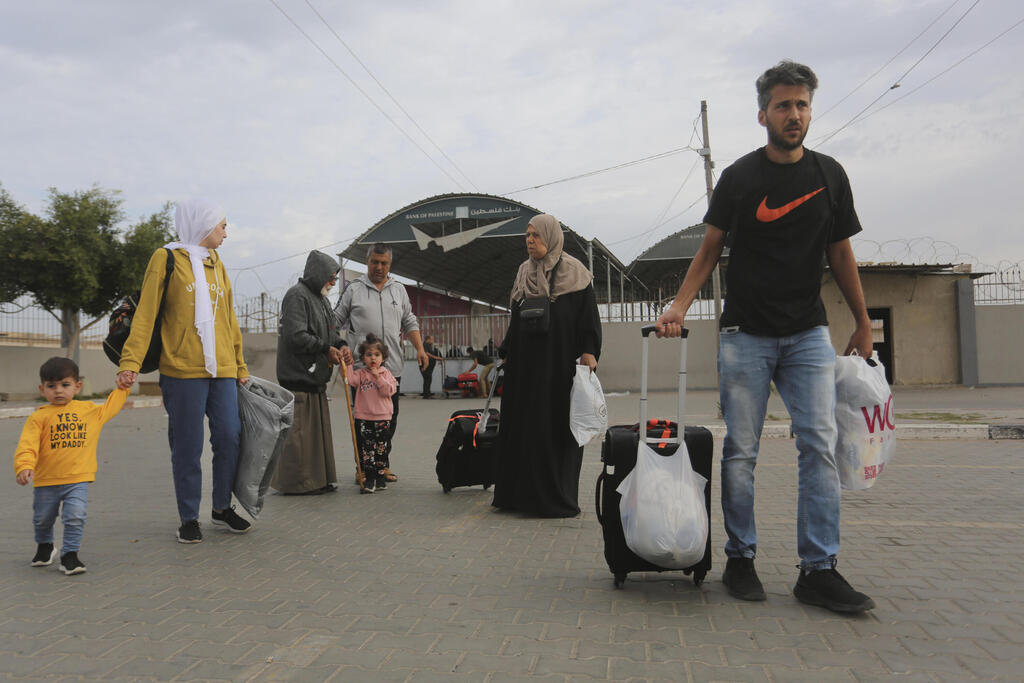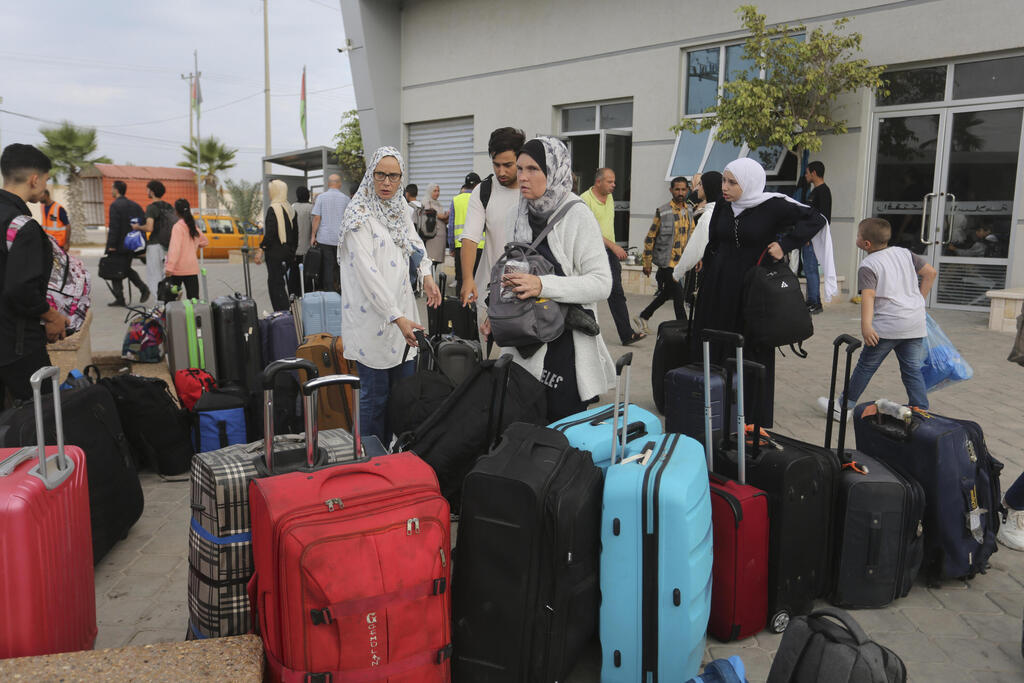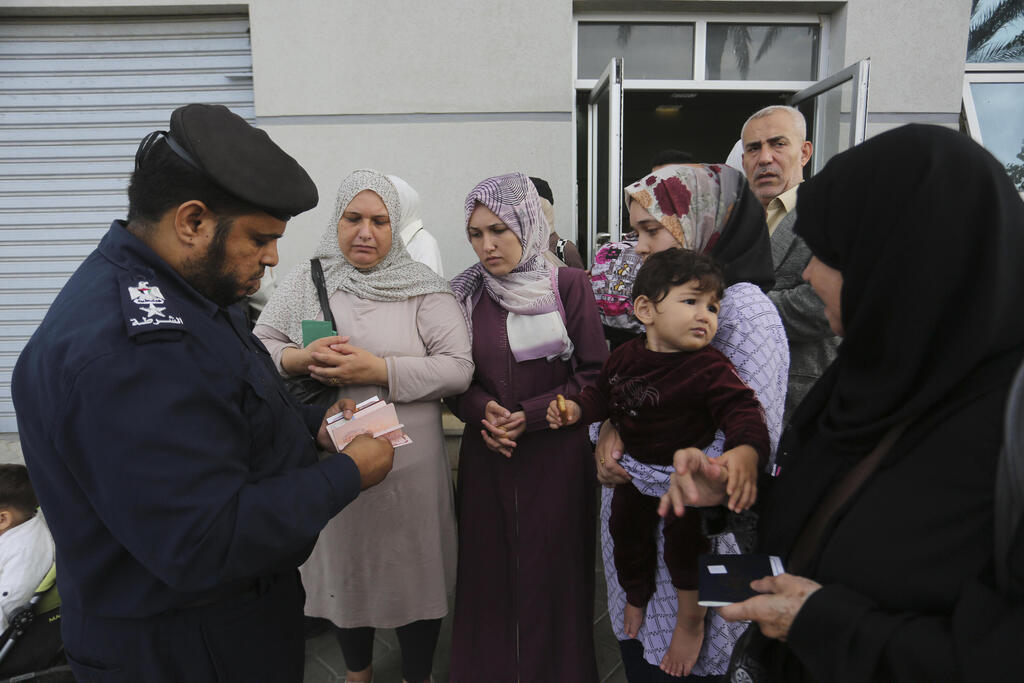Getting your Trinity Audio player ready...
"Before October 7, escaping from Gaza was the most popular dream among Palestinians. The atmosphere, especially among the youth, was complete despair, and this may have been one of the reasons Hamas started the war - to save itself from civil unrest, said S., a Gazan media figure who escaped to Egypt with his family during the war.
"Nine months later, the desire to emigrate is reaching new heights, but the ability to realize the dream has been significantly reduced, and what remains is only deep despair," S. added.
The topic of emigration has recently gained unprecedented popularity in Palestinian discourse following the release of a survey showing that about a quarter of Palestinians (31% in Gaza and 21% in the West Bank) are considering leaving. The survey, conducted by Khalil Shikaki in the Palestinian Center for Policy and Survey Research (PSR), was carried out before October 7 but was only published now.
According to the survey, the desire to emigrate is most prevalent among youths aged 18-29 (44% in Gaza and 28% in the West Bank) and among those with academic degrees (28% in Gaza and 29% in the West Bank). The main reason for emigration before October 7 was improving economic conditions, followed by the desire to acquire education and improve the feeling of security. The most sought-after destination was Turkey, followed by Germany, Canada, the U.S. and Qatar.
The departure of young people has been a painful issue for Palestinians for years due to the fear that Palestinian society was losing its young minds. This prompted the people to urge the leaderships in Ramallah and Gaza to come up with solutions to the problem, especially concerning employment for the younger generation.
Four days before the outbreak of the war, Gaza-based columnist Fayez Abu Shamala wrote that the emigration of young people is a national threat that gives a demographic victory to the Jews. Israel is encouraging the departure of young people by worsening their living conditions and easing emigration procedures, and the Palestinian leadership must give this issue a top priority.
Gaza, with its lack of prospects, generates statements like "escaping to the unknown is preferable to staying in the Gaza prison." Journalist Hamza Hamad even summarized that the only two options for a young Gazan are "emigration or suicide."
In the decade before the war, 60,000 Palestinians left the Gaza Strip, many of them educated young people, suffering from a 70% unemployment rate before the war. According to the Palestinian Authority, 860,000 people have left Gaza since Hamas took control in 2007. Evidence of this trend was seen last September, a month before the war, when chaos erupted in Gaza while thousands of Gazans crowded the "Passport" travel office, which issued visas to Turkey. The 18,000 permits granted provided a meager response to the enormous demand.
Tragically, about 400 young Gazans drowned while trying to emigrate illegally to Europe in recent years. Hassan Abed, a 24-year-old Gazan, described a month before the outbreak of the war his personal journey, similar to those undertaken by thousands of Palestinian youth and many others planning: "In 2018, I left with a tourist visa to Egypt and then went to Turkey, where I lived for about two years. After raising a few thousand dollars, I smuggled myself by boat to Greece, and from there continued to Germany, where I live today." Before the war, Palestinians were the largest group among asylum seekers arriving in Greece.
"None of my children continued living in Gaza," said M., a Fatah activist from Gaza who now lives in the West Bank. "Like many young people who obtained education and became frustrated with finding work and starting families. They leave for anywhere that will accept them and can be found all over the globe - from Iceland to Australia."
The accelerated emigration has led to the creation of large Gazan communities in Europe, particularly in Belgium. "In Belgian cities, there are streets that no one knows by their original name," said Gazan youth Fadi Musbah, "everyone only uses the names of the Khan Younis clans living there."
The war has led to a sharp increase in emigration despite the obstacles, which has already caused a dramatic demographic change in Gaza. Although there is no official data on the subject, a senior UN official working in the Palestinian arena said that about 133,000 people, around 7% of Gaza's population, left between October 7 and May 6, the date when the IDF took control over the Rafah Crossing. Before the IDF took over the crossing, the smuggling industry thrived in Rafah, resulting in the wealthier Gazans bribing their way into Egypt. Since then, there has been no movement allowed on the Gaza-Egypt border. The permit's cost ranged from $6,000 to $12,000 per person, allowing the wealthy to establish a community of about 100,000 Gazans in Cairo, joining tens of thousands who lived in the city before the war.
"There is no doubt that if a survey were conducted today regarding emigration aspirations in Gaza, the figures would be much higher than those recently published," said Dr. Mohimer Abu-Saada, a political science researcher who left Gaza during the war and now lives with his family in Cairo. "Gaza today is a place one can only leave. Most of the Strip's residents have become refugees, and there is no infrastructure."
He also said that 8% of the people who lived there until October 7 have disappeared: about three-quarters have left, and the rest are either dead or missing. "If the Rafah crossing reopens, there will be a mass exodus. I guess that I will not return to Gaza even if the war ends."
Many Palestinians claim that Israel is trying to implement the "long-standing Zionist vision of pushing Palestinians out of the land" highlighting statements made by ministers such as Ben-Gvir and Smotrich during the war to encourage voluntary emigration. However, Palestinians are pleased with reports of many Israelis who leave the country. Arab media claims half a million Israelis left Israel when the actual numbers are significantly lower.
In June, Hamas declared that the departure of Israelis from their land is a sign of "the erosion of their existential security," and that "Netanyahu, who tried to encourage Palestinian emigration, is ultimately dealing with Israeli emigration."
The thought of Palestinian and Israeli emigration leaves Israel questioning, will only the weak and those without prospects remain in both communities. With around 7 million Jews and non-Jews between the river and the sea, Israel must prepare for national decisions. Also, the trend of integration between Israel and the West Bank is growing. Instead of fortifying itself in slogans and illusions, Israel would be better served to formulate a clear and realistic strategic vision regarding the future of relations with the Palestinians.






